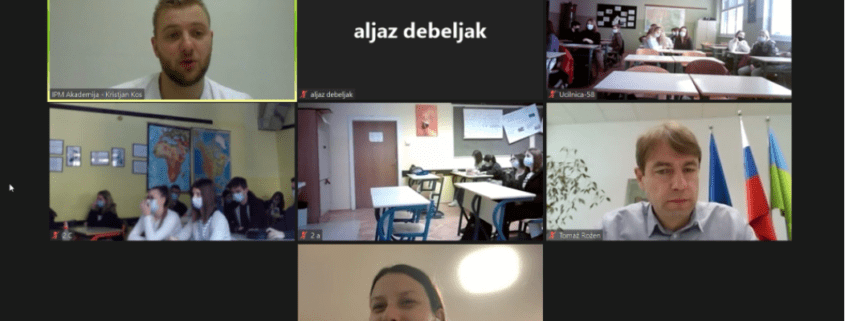Today, 15 February 2022, MEP Irena Joveva attended the Think and Speak Up! event, which addressed the issue of low levels of active citizenship among young people, one of the biggest problems facing modern democracies. She spoke with secondary school students from Gimnazija Ravne na Koroškem, and the project was organised by the IPM Academy in cooperation with Slovenian secondary schools.
During the debate, Joveva listened to the ideas of young people, who took the role of decision-makers and presented their proposals for action in the field of youth policies, with the aim of implementing the EU Youth Strategy 2021-2027. The event was also attended by the Mayor of Ravne na Koroškem, Tomaž Rožen.
Students presented ideas and solutions in three strands: sustainable green Europe and rural development, quality jobs and quality learning, and gender equality and mental health.
In the first part, students addressed the challenges in the fields of energy, investment in public transport and the need for higher taxes on polluters. In the area of development steps for rural youth, they highlighted, among other things, the desire for better transport infrastructure, modernisation of schools and active state support for local farmers.
In response to their suggestions, the MEP described the measures proposed by the students as very realistic, noting that most of them are already being implemented. She introduced the students to the European Green Deal and the 2050 climate neutrality target, and explained the importance of the taxonomy or classification of green investments, pointing out that despite the inclusion of nuclear energy in the taxonomy, the future lies in truly green investments such as wind and solar energy. She spoke about a cross-border carbon mechanism which would ensure that also non-EU producers pay for pollution, and touched on the Recovery and Resilience Fund, the Common Agricultural Policy and the importance of digitisation.
In the second strand, young people focused on quality jobs and quality learning. They proposed setting up non-formal learning communities at the local level. In addition, they stressed the importance of creating more jobs for young people and the need for fair pay and payment for overtime.
The MEP commented that the areas of education and employment are most effectively regulated at local and national level, as they fall under the competence of the Member States. She supports the idea of the young that holiday work and work placements could also count towards years of service. A related topical issue, she pointed out, is an amendment to the EU Youth Strategy that would ban unpaid work placements, which is expected to be adopted this week in the EP Plenary. She also touched on the minimum wage and the problem of precarious work, stressing that the key solution in this respect lies with employers.
In the final strand, students focused on gender equality and mental health and well-being. Most of them agreed that the ubiquitous stigma and stereotypes associated with this topic are still a major problem.
“What is needed is a change to the mindset. And this will happen with the next generations.”
Concluding her remarks, the MEP assured the young audience that she understood that politicians often get on their nerves, but impressed upon them that this is not always justified, because not everyone is the same, and she therefore disapproved of generalisations. She thanked the participants for their suggestions and the solutions they offered and encouraged them to remain active and curious.




Leave a Reply
Want to join the discussion?Feel free to contribute!